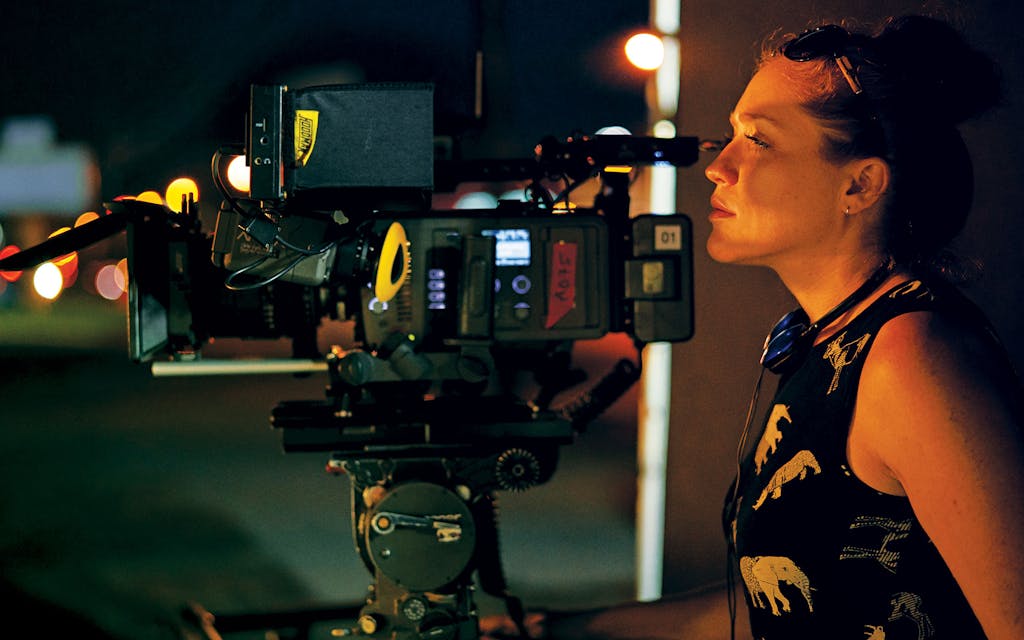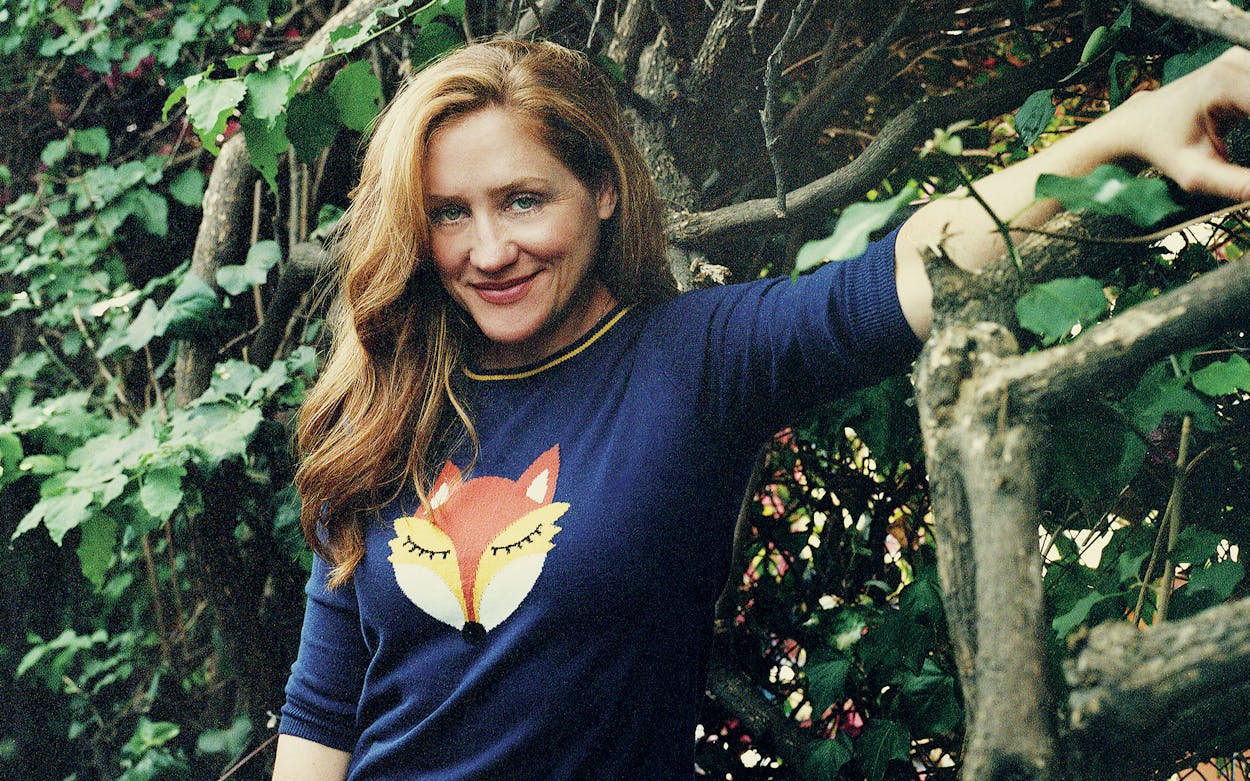Augustine Frizzell still can’t quite believe that it’s all happening. “It’s insane,” she said, curled up on a couch at her short-term rental in Los Angeles on a mid-June evening. “I want a vacation to just step back and be like, ‘This is what I’m doing with my life.’ ”
The 39-year-old Dallas-based director had spent the previous two weeks directing the pilot episode of Euphoria, a drama of sex, drugs, and unsupervised teen lives that HBO is considering for its lineup. And earlier that day she’d been on set rehearsing an elaborate special-effects shot that she and the rest of the crew had been eagerly anticipating. “It’s amazing to see it finally in action, but it’s also like, ‘What if this doesn’t work and, like, that’s a million dollars?’ ” Frizzell said, still gobsmacked at the expense. “That’s, like, five of my movies.”
Lately, Frizzell’s life has been full of such moments. Less than a year ago she was in production on her debut feature, Never Goin’ Back, a shaggy-dog comedy about two teenage best friends, Jessie and Angela, that Frizzell shot in Grand Prairie and Fort Worth on a modest budget with no big-name stars. Then the film was accepted by Sundance. Then it was bought by A24—the powerhouse indie distributor behind 2016 Best Picture winner Moonlight—which scheduled it for nationwide release on August 3. Then Frizzell got the HBO gig, the kind of much-coveted job that often goes to Hollywood’s most powerful filmmakers. Now she’s slated to direct an as-yet-unannounced studio movie. And all of this comes before anyone outside of festival audiences and industry insiders has even watched more than a few minutes of her work.
Such a meteoric ascent is rare for any up-and-coming filmmaker, but it’s especially unusual for someone with Frizzell’s background. She dropped out of community college, had a daughter at age nineteen, and has spent much of her adult life barely scraping by. She has worked as a server, an alcohol promoter, a nanny, and a yoga teacher, all while trying to make it as an actor in North Texas. Even after she married David Lowery, the Dallas-based director of 2017’s A Ghost Story and the upcoming The Old Man & the Gun, and became close friends with his tight-knit circle of filmmakers, Frizzell still couldn’t fathom making a movie on her own. But once she’d taken the plunge, she approached filmmaking with single-minded determination.
“Augustine is one hundred percent the type of person where, if she is going to do something, she’s just going to do it,” said James M. Johnston, one of the producers of Never Goin’ Back. “She could have just as easily decided she wanted to be an astronaut, and if she did, she would have become an astronaut.”

Never Goin’ Back is based on Frizzell’s own unmoored teenage years, but the often-outrageous film may actually be less sensational than her life. As Frizzell tells it, she was “raised around a bunch of craziness.” Her paternal grandfather was country music star William Orville “Lefty” Frizzell, who had a reputation as a hell-raiser and died in 1975 at age 47, largely from the effects of alcoholism. Frizzell was born four years later, and whatever cash remained from Lefty’s 1950s hits, like “If You’ve Got the Money (I’ve Got the Time),” didn’t accrue to the young Augustine. Her parents split up when she was six, and as a teenager, she was passed back and forth between her mother, who worked in a factory in Dallas, and her father, a musician in Panama City Beach, Florida.
After she turned fifteen, Frizzell decided she’d had enough. She, her brother, and her brother’s girlfriend struck out on their own and moved into a Florida motel, where they panhandled for cash and shoplifted most of their food. At one point Frizzell hatched a plan for an easy money heist: she knew a girl who worked as a clerk at a souvenir shop near the beach and proposed that they steal the cash in the register, split the money, and then have the friend tell the police that the store had been robbed in a stickup. It worked. (Jessie and Angela stage a similar scheme in Never Goin’ Back.)
After a few months, Frizzell ended up back in the Dallas area, living with her brother’s now ex-girlfriend, who had become her not-entirely-platonic best friend. (“Yes, my brother and I slept with the same girl, if that’s what you’re asking.”) They had no school, no parents, and a lot of time. “We worked at IHOP, did a bunch of drugs, paid rent,” she said. They also watched a lot of movies, memorizing lines from the surfing crime drama Point Break and thrilling to Quentin Tarantino’s Reservoir Dogs. (Frizzell had a crush on Steve Buscemi’s character, Mr. Pink.) Frizzell moved back in with her mother when she was seventeen, but by then she’d barely attended high school and had a lifetime’s worth of stories instead. “I spent two prime teen years living this crazy life,” she says.

Silver Screen
Even with mounting success as a director, Frizzell hasn’t given up acting completely. In the past five years, she’s had roles in fourteen films, five of them directed by her husband.
Frizzell had dreamed about becoming a pop star like Madonna, but she suffered from stage fright and hoped an acting class would help her overcome it. It turned out acting suited her better than music did, and soon she had a steady job with an improvisational murder-mystery theater troupe, the Comedy Killers, that entertained guests on a riverboat on Dallas’s Lake Ray Hubbard several nights a week. (“She was really good at filling the gaps and evolving the story,” Tim Shane, the company’s director, remembers.) Frizzell loved it, but she also needed the money. In 1998 she gave birth to her daughter, Atheena, and began a decade and a half in which she juggled child care, part-time jobs, and acting in commercials and independent films.
As Atheena got older, Frizzell began homeschooling her in the “unschooling” tradition, a progressive educational approach that emphasizes experiential experimentation over classroom learning. Filmmaking was a recurring part of the mother-daughter curriculum, and Frizzell learned the basics of professional editing software at an unschooling conference. But the thought of pursuing professional movie projects made her anxious, particularly once she started living with Lowery, in 2009.
“I was really embarrassed to admit that I wanted to make things, because he was so accomplished,” Frizzell told me. “It’s a feeling where you’re like, ‘I kind of want to do that, but I don’t want you to make fun of me because I’m a beginner.’ ”
She worked up the courage to tell Lowery about her filmmaking ambitions (“He was super supportive”), and soon she was shooting her own movies. The early feedback from the industry was encouraging, and in 2014 her second completed short, the intimate romance I Was a Teenage Girl, was accepted into South by Southwest.
“For me, that was a glimmer,” said Claudette Godfrey, a senior film programmer at SXSW, who selected the short for competition. “It was pretty slight, which is not usually a word that we use in a positive way, but you could see that it was well done, and you could feel the authenticity. I wrote at the end of the evaluation, ‘I think she can grow more.’ I couldn’t wait to see the next thing.”
“I look back on it now, and I’m like, ‘That was kind of stupid.’ When you have so many great resources around you, it’s only pride that keeps you from using it.”
Around that time Frizzell had begun writing a script called Never Goin’ Back, about two teenage roommates pursuing a familiar agenda of working at a diner and doing a bunch of drugs, and she managed to secure a grant from the Austin Film Society to fund it, planning a sixteen-day shooting schedule in August 2014. She decided not to involve Sailor Bear, Lowery’s filmmaking collective with Johnston and Toby Halbrooks. “I look back on it now, and I’m like, ‘That was kind of stupid,’ ” Frizzell said. “When you have so many great resources around you, it’s only pride that keeps you from using it.”
Even before the start of production, something seemed off to Frizzell. She’d felt pressured to change the script to make the story more conventional, and when the shoot was over, she struggled to edit the footage into something she’d be proud of.
“The impression was that she knew that it wasn’t there,” Halbrooks remembers. “I saw it and said, ‘Augustine, there are fifteen minutes of material in this movie that could launch your career. If you can make the whole movie as good as those fifteen minutes, you could have a huge career as a director. This story is good enough to really work. This isn’t a failure.’ ”
The version of Never Goin’ Back that will be released this summer is completely different from the earlier one, which Frizzell never released publicly. Frizzell rewrote the script, hired a new cast and crew, and, with more time, more money, and the support of the Sailor Bear team, she went about blowing off the typical Hollywood story beats and amping up the comedy. As a way of putting the previous version to rest, she cut the few parts that she liked of the original film into a short titled Minor Setback.
For those expecting a more stereotypical Sundance indie, the sheer volume of gags quickly dispels the notion that Never Goin’ Back is the least bit self-serious. Jessie’s constipation (and salvation from it) becomes a recurring plot point. Angela experiences a well-timed bout of projectile vomiting. Throughout the film, both girls concoct elaborate ruses to get excused from work, allowing themselves to get bitten by mosquitoes to fake chicken pox and punching each other with a brick to make it look as if they’ve been in a car accident. In the film’s opening shot, we see Angela, tongue pressed to her teeth in concentration, carefully drawing male genitalia on a sleeping Jessie’s face with a marker, then waking her up with a whisper: “We have to get up now, because I have something really, really awesome to show you.”
But Never Goin’ Back isn’t pure slapstick. Jessie and Angela may talk about poop and have an unfortunate incident involving bong water and edibles, but these experiences only make their friendship feel more lived-in and intimate. They share a room, sleep on the same mattress, and speak to each other in a private language. Frizzell has said that she wrote Jessie and Angela as lovers, although there’s no sex shown in the film. It’s their intimacy and mutual support that are the point.
When Frizzell was thinking about the kind of story she wanted to tell in Never Goin’ Back, she decided to steer clear of anything resembling a cautionary tale. Yes, her leads do too many drugs and botch a series of poorly conceived schemes, but they always emerge smiling. Frizzell sees their resilience as a symbol of her own success.
“A lot of people don’t understand why I would want to make a comedy about something that was clearly a heavy time,” Frizzell said. “But, look, I’m making a living as a director, and that’s because of all of that shit that’s happened to me. So, I look back on it very fondly. I’m like, ‘Thank God I had those crazy experiences to just make use of creatively.’ ”








